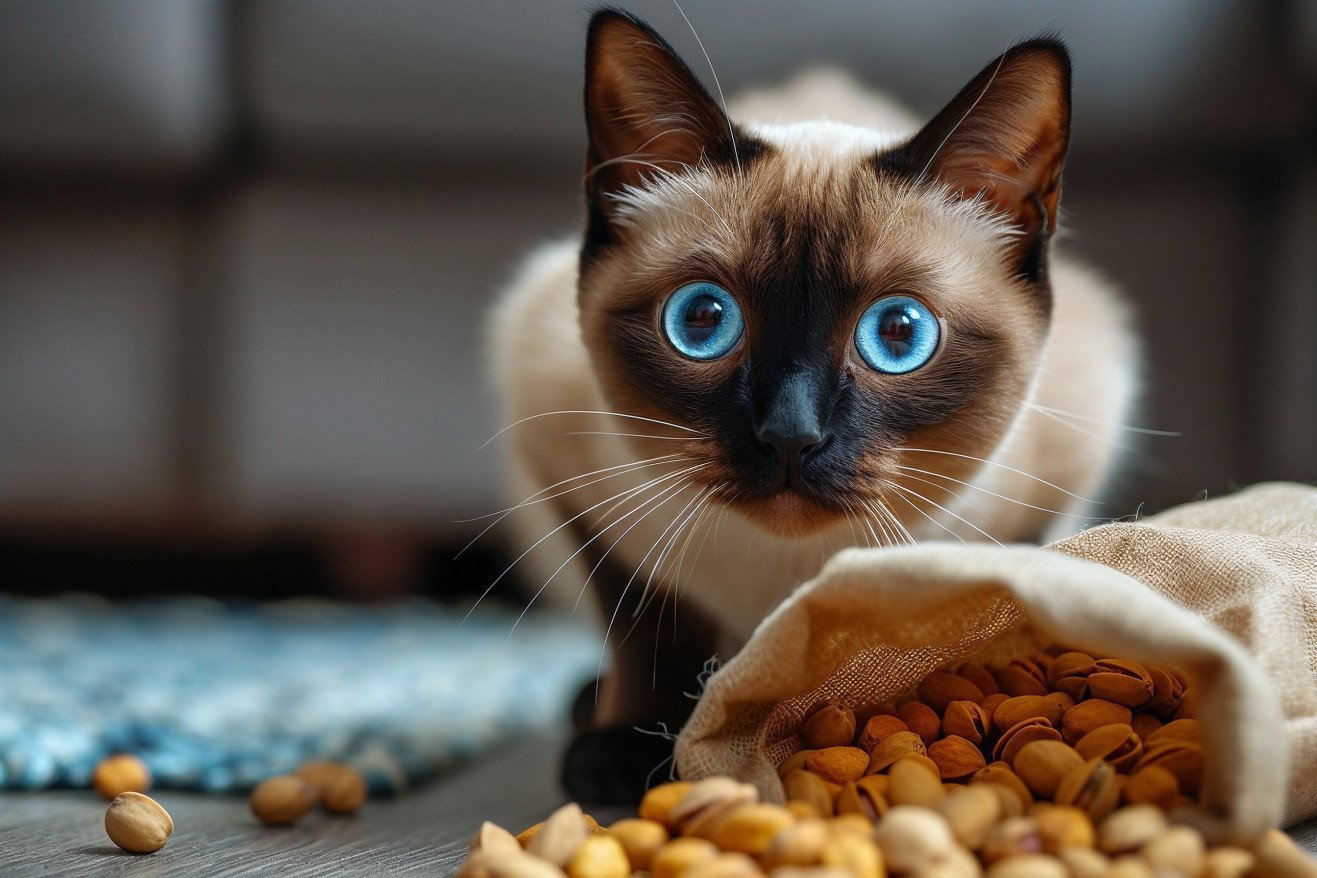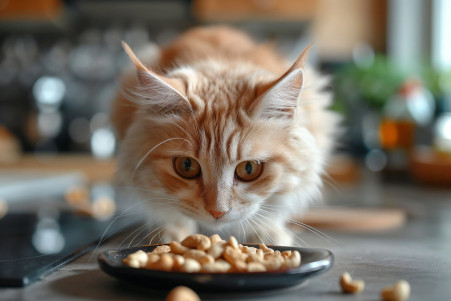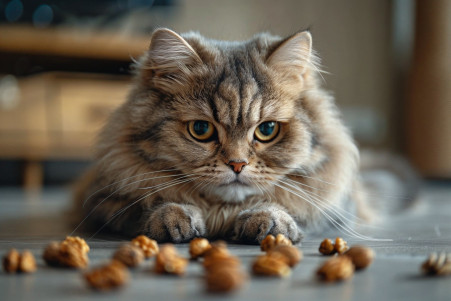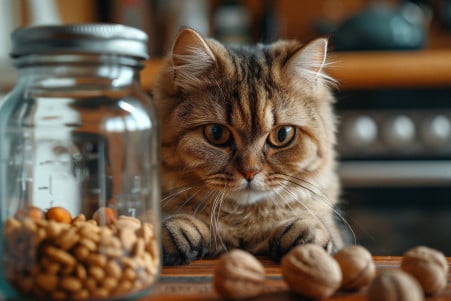Can Cats Eat Pistachios? Nutritional Safety for Felines Explained
8 February 2024 • Updated 7 February 2024

Pistachios are a favorite snack for many people, but can your cat enjoy them too? Cats cannot eat pistachios because they are high in fat and may contain harmful additives. Eating pistachios can lead to digestive upset, obesity, and pancreatitis in cats, and the shells can be a choking hazard. As a result, it’s important to make sure that your cat can’t get to pistachios.
This article will use insights from veterinarians and research about nutrition to explain why pistachios and other nuts aren’t good for cats. We’ll cover the nutritional needs of cats, the health risks of high-fat foods, and the signs of nut-related issues in cats. After reading this article, you’ll know what to consider when making decisions about your pet’s nutritional needs and safety.
Can cats eat pistachios?
Meeting the Needs of the Carnivore: What Cats Should Eat
Cats are obligate carnivores, which means they require nutrients that are only found in animal products. As the Cornell University College of Veterinary Medicine explains, the ideal cat diet is high in protein and low to moderate in fat, with carbs being a distant third. Cats also need essential nutrients like vitamins, minerals, fatty acids, and amino acids, which are not found in plant-based foods like pistachios.
As a paper in PMC explains, cats also have a lack of certain enzymes that are needed to digest plant-based foods, which is one of the unique digestive and metabolic adaptations that have evolved to process animal tissues.
This means that cats are not well-equipped to deal with the plant-based compounds and high fat content in nuts. Feeding cats pistachios, especially in addition to other foods that are outside of their highly specialized dietary needs, can lead to nutritional imbalances and health problems.
Feeding cats pistachios and other nuts can also lead to other problems beyond immediate digestive issues. When you consider the specific dangers of high-fat foods, it’s easy to see why cats need to stick to a diet that meets their carnivorous needs in order to stay healthy and thrive.
Fatty Snacks and Your Cat’s Health
The health risks of high-fat foods like pistachios to cats are numerous, but obesity and pancreatitis are two of the most significant. A study in PubMed found that cats digest different fats at different rates, and fat digestibility in senior cats is significantly lower than in younger cats. As a result, high-fat diets may be harder for older cats to digest, which could lead to health problems.
Obesity can cause a number of other health issues in cats, and pancreatitis, which is an inflammation of the pancreas, is a painful and serious condition that’s often associated with high-fat diets. A study in ScienceDirect found that senior cats have a “significant decrease in the apparent digestibility of macronutrients, especially fat,” which impacts their dietary energy intake and may increase the risk of pancreatitis.
Cats’ fat metabolism is unique compared to that of other animals and even humans, as shown by several studies on nutrient digestibility, including those in PMC. Cats have a hard time digesting high-fat diets, which makes foods like pistachios potentially dangerous. Knowing this can help cat owners make better decisions about their pets’ diets, avoiding snacks that could lead to discomfort or sickness.
Toxic Ingredients and Cats
Pistachios and other nuts can have ingredients that are toxic to cats. VCA Animal Hospitals explains that cats have reduced liver enzymes, which makes them more susceptible to toxicosis. Symptoms of toxicosis in cats can include vomiting, diarrhea, lethargy, and even more serious neurological and respiratory problems. Cats are also more sensitive to certain ingredients in pistachios, like salts and artificial flavorings, which can make their symptoms worse.
DailyPaws lists nuts as a human food that cats should not eat and notes that ingredients like theobromine, which is found in chocolate-covered pistachios, are toxic to cats.
Meanwhile, the Cornell Feline Health Center explains that certain ingredients, like garlic or onion powder, can cause anemia in cats. If you think your cat has eaten toxic foods, you should act quickly. The ASPCA Animal Poison Control Center recommends contacting your vet immediately, as getting treatment for your cat as soon as possible can be critical to their recovery.
Prevent the risk of toxic foods by keeping them away from your cat. Knowing the potential risks of certain human foods can help you make sure you’re keeping your pet safe and avoiding a trip to the vet.
Healthy Snacks to Give Your Cat
In addition to keeping things interesting for your cat, offering a variety of treats can also help support your cat’s overall well-being. Catster notes that chia seeds are a healthy alternative to pistachios that can provide cats with a number of benefits, including amino acids and antioxidants, without the negative effects of high-fat nuts.
You’ll want to soak the seeds and start with small amounts, up to a quarter teaspoon per 5 pounds of your cat’s weight, to avoid digestive problems.
When it comes to giving your pet treats, it’s important to remember the importance of moderation. Royal Canin recommends maintaining a balanced diet by adding new treats in gradually over the course of at least a week and starting with small amounts to avoid stomach upset. Meanwhile, PetMD stresses the importance of slowly introducing new foods to prevent tummy troubles and ensure a successful changeover.
It’s important to make sure you’re aware of which human foods are safe for cats and which ones are not. By carefully introducing new treats and sticking to cat-friendly options, you can improve your cat’s diet and support their health and happiness. This responsible way of giving your cat treats will help ensure that your cat has access to a range of healthy and nutritious snacks.
Conclusion: Can Cats Eat Pistachios?
To sum up, pistachios are not a good option for your cat. While not toxic to cats, pistachios can be dangerous for a number of reasons, including the risk of obesity, pancreatitis, choking, and the potential for aflatoxins, according to Betterpet.
The high fat and indigestible fiber content in pistachios can be especially problematic for cats, and the flavorings and preservatives in pistachios can also be dangerous because cats are more sensitive to certain food additives.
Cats are obligate carnivores, which means they need a diet that includes animal proteins and specific nutrients, according to Cornell University College of Veterinary Medicine. Pet owners should respect these dietary requirements and avoid giving their pets human food that can be dangerous, such as pistachios. To protect your cat’s health, make sure to keep potentially dangerous foods like pistachios away from your pet.
In conclusion, it’s important to remember that the foundation of good feline health is a healthy diet. By learning about and respecting their dietary needs, we can help our cats stay healthy and avoid diet-related health problems.


